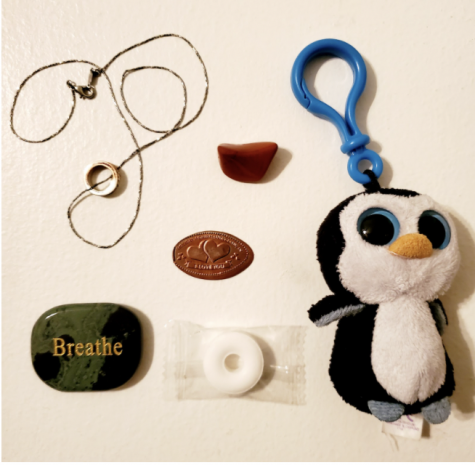8 ways to improve your mental health: LGBTQ+ edition
Photo by Dustin Kiefer.
June 1, 2021
The COVID-19 pandemic has been a mentally challenging time for many people. Because of quarantine and social distancing, these mental challenges have been even more difficult to handle, and the mental health of many people has declined as a result.
The loss of support systems, distance from friends and loved ones and isolation at home are all factors that can cause one’s mental health to decline. For individuals in the LGBTQ+ community, these challenges can be even more difficult to cope with. Many LGBTQ+ individuals lost accepting and positive support systems and had to return to unaccepting environments as a result of the pandemic.
There are numerous ways one can overcome these challenges and work on improving their mental health. The following is a list of tips to improve mental health compiled from interviews with LGBTQ+ individuals. Here are 8 ways you can improve your mental health:
1. Allow yourself to feel your emotions.
Your emotions are always valid. Oftentimes people will say things like “You’re being too sensitive,” “Suck it up,” or “Get over it.” Comments like these are really insensitive. You have the right to feel your feelings, and you should allow yourself to have time to do that. It’s okay to cry, scream or take a mental health day. Take some time to allow yourself to feel. Bottling up your emotions is never healthy.
2. Surround yourself with accepting people.
It is really draining to spend large amounts of time with people who don’t accept your sexuality. It can also be really hard on your mental health.
“For someone who is struggling, it’s just about knowing who your resources are,” said Josiah Pohl (he/him), a junior digital art major and vice president of IUS Spectrum.
Your resources can be anyone who you can safely talk with about things like your sexuality or your mental health.
Take time to social distance with or speak online with people in your life who have an accepting point of view about the LGBTQ+ community. Join an LGBTQ+-focused online chat or forum where you can make connections with people going through similar challenges and hardships. Your sexuality is valid. Surround yourself with people who will support you for who you are.
3. Accept your feelings.
It’s okay to admit that you are struggling. It’s okay to be sad or depressed.
“Make sure that you’re identifying that you’re struggling,” said Stephon Camp (they/them), an IUS alumni and co-advisor of IUS Spectrum. “Reach out if you feel it’s something you can’t handle, when you feel overwhelmed.”
If you feel like your mental state is crippling or overwhelming, seek help. Things can always get better, but the first step is reaching out for help.
4. Find a coping hobby.
When faced with anxiety and depression, a knee-jerk reaction is to try to fix the situation that is causing your anxiety. However, in the context of a pandemic or in a world that seems to be unaccepting of the LGBTQ+ community, it’s not always possible to change your situation. This is when finding a fun activity or hobby can help.
As well as wearing masks and staying socially distant, the CDC also recommends young people coping with the pandemic to, “try to do activities you enjoy, like exercising, gaming, reading or other hobbies.” So start playing games like Animal Crossing, walk your dogs or perfect your ramen recipe: doctor’s orders.
5. Listen to your loved ones.
Many times we refuse to listen to the people we love and trust when they point out something seems wrong or off. The basic excuses like, “I’m tired,” or “It’s just been a stressful week,” are not the right answer. No one should ever have to struggle alone.
“If people in your life are seeing signs of something, listen to them,” Camp said.
If someone you love and trust is saying you need to talk with someone and get help, you should.
“Always reach out for help,” said Julia King (she/her), a junior history major and treasury secretary of IUS Spectrum. “Even the littlest things can show someone that a person needs help. Send an anonymous note.”
It’s okay to reach each out to a therapist. Getting help with your mental health is normal.
6. Have an “emotion emergency” kit.
Everyone has items that bring them comfort and help them relax. You should keep a few items that bring you comfort or make you happy with you at all times.
“I dubbed it ‘the emergency kit,'” said Jeanette Hansen (she/her), a senior graphic design major and president of IUS Spectrum. “Carrying a small bag or keep in your bag some things that will help you calm down and keep yourself happy if you’re feeling really stressed or upset.”
For example, Hansen said she used to carry little turtle plushies in her emergency kit.
Whenever you are stressed, overwhelmed, anxious or sad, just pull out a few items from your emotion emergency kit to help you calm down and make you smile.

7. Use your resources to get help.
It’s okay to ask for help. IU Southeast has free campus resources to help students who are struggling with their mental health. At the IUS personal counseling center students can make online therapy appointments and read helpful material related to mental health especially centered around the pandemic. An IUS student can make as many therapy appointments as they want free of charge.
8. Check in on friends and family who check in on you.
It’s often the people in our lives who appear to have it all together who are struggling on the inside. It makes sense for someone with their own battle with mental health to be very conscious of the wellbeing of others.
“I feel like those who really struggle with mental health issues are the ones who are always reaching out to people and it’s people who don’t reach out for themselves,” King said. “Maybe if they’re reaching out to you [to check on your mental health] you should reach out to them to see if they’re okay.”
The COVID-19 pandemic may have caused many a decline in the mental health of many people, especially LGBTQ+ individuals, but by using the tips listed above you can work to improve your mental health starting today. Whether it be through reaching out to loved ones or keeping stuffed turtles in your pocket, there are numerous ways you can work to improve your mental health.





